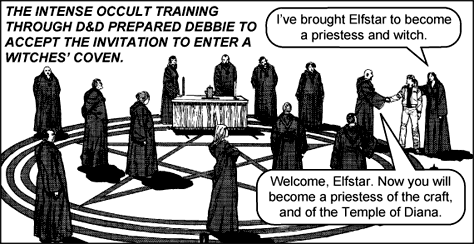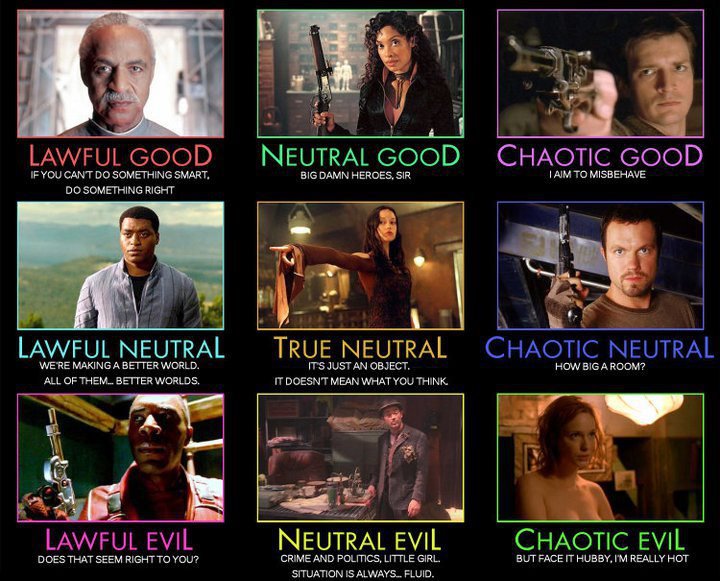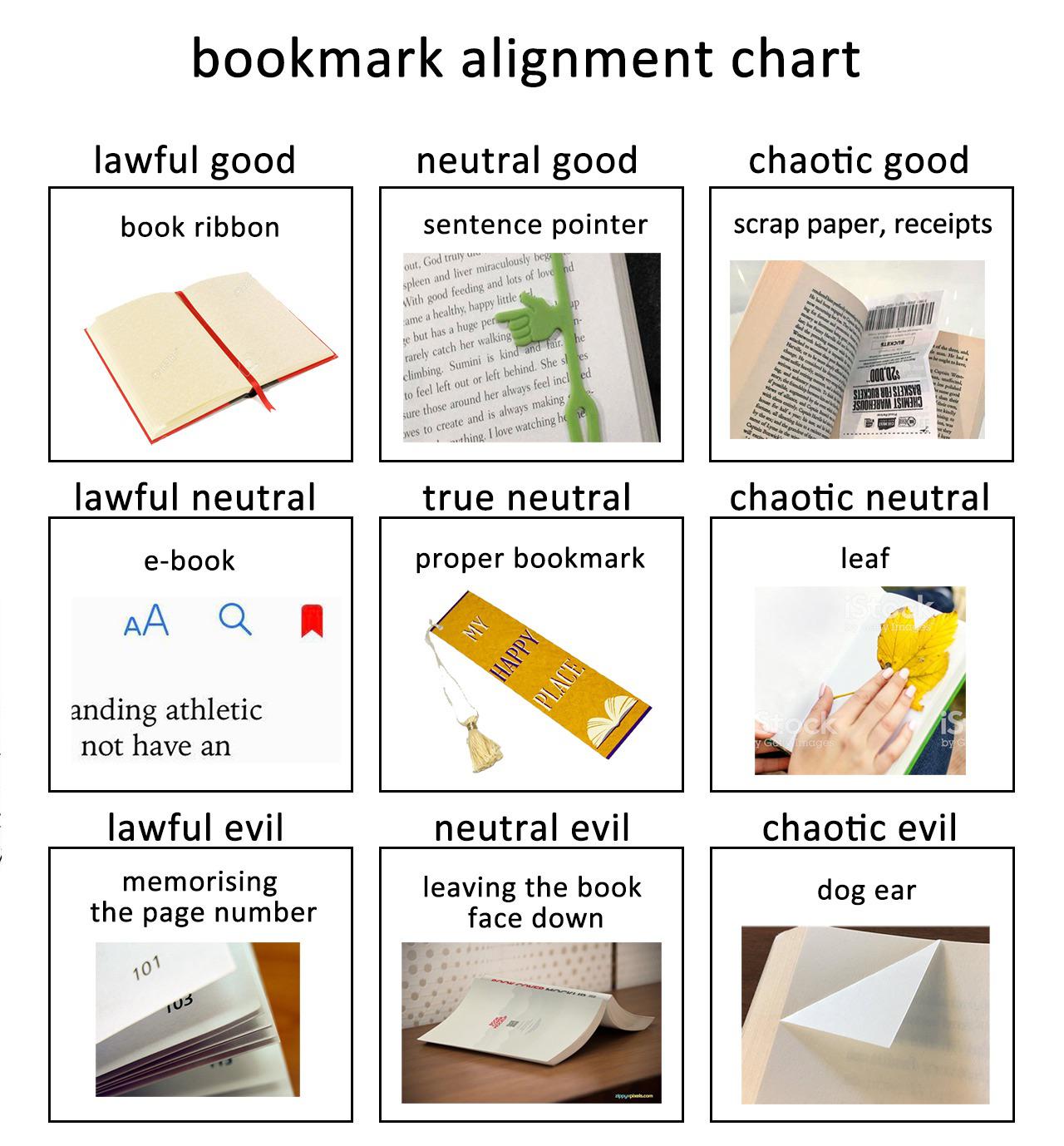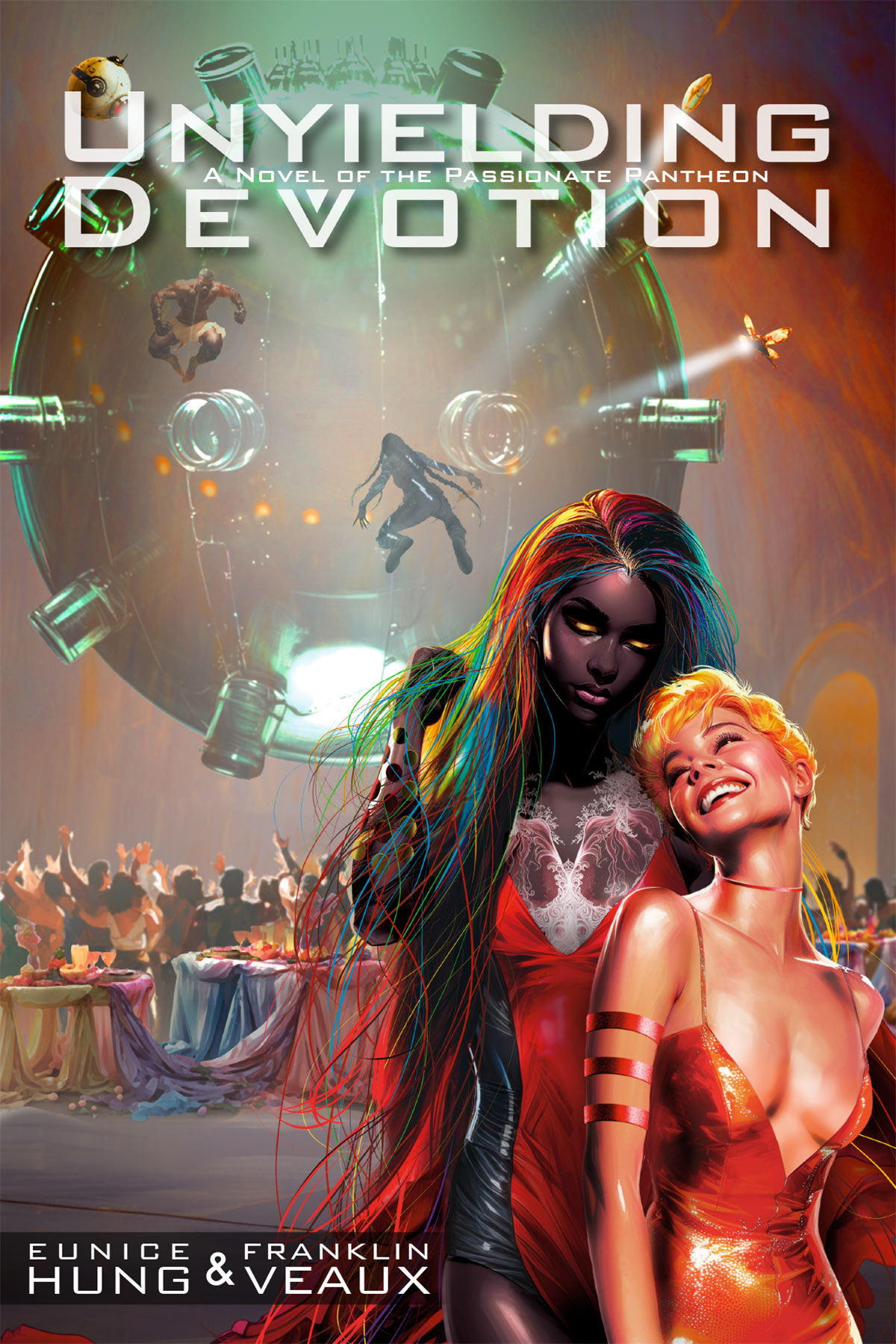So let’s talk about Dungeons & Dragons.
Dungeons & Dragons is famous for basically three things: creating an entire cottage industry of weird foaming-at-the-mouth Evangelical cries of satanic doom that will sweep over the land, covering it in darkness forever and ever; giving socially awkward high school students of a certain era something to do and a way to make friends; and, of course, the D&D alignment system, which divided all of morality into a tidy grid with nine different possibilities.

What Evangelicals think D&D looks like

What D&D actually looks like, but with more dice and books (image: No Revisions)
The Dungeons & Dragons alignment system divided morality into Lawful, Neutral, and Chaotic on one axis, and Good, Neutral, and Evil along the other. It’s become a cultural touchstone (or a cliché, if you’re less charitable) that has spawned a zillion parodies:


But here’s the thing:
The problem with D&D morality is that it assumes there’s some fixed definition of “good” and “evil.”
You know how relativity tells us all motion is relative? If two people go whizzing past each other in space, each one is at rest in his own reference frame and sees the other one moving.
Real morality is kind of like that. Most people truly, honestly believe they are good. That’s their local inertial frame. For example: Most people agree that violence in defense of your life or the life of another is morally good. The guy who plants a pipe bomb in an abortion clinic? That’s what he thinks he’s doing: defending the lives of babies being murdered. In his eyes, blowing the limbs off clinic workers is morally good.
That’s his inertial reference frame. He would consider himself neutral good; D&D would call him neutral evil, or possibly chaotic evil.
D&D morality, like Newton, assumes the existence of a fixed reference frame from which to evaluate all morality.
In real morality, various people have defined various reference frames. Some folks use “society” as a reference frame, which is all well and good until you encounter cases like “if a society says slavery is moral, then for that society, slavery is moral.”
Utilitarianism is kind of the equivalent of using the cosmic microwave background radiation as your reference frame. If you see a dipole in the CMB, you’re moving, and more specifically, your vector of motion is oriented toward the blueshift in the CMB.
It’s not a perfect analogy; motion is a single vector and D&D has two axes (good <-> evil and lawful <-> chaotic). But it gets the point across.
If we set the CMB to our D&D framework, then probably, yes. Most people are probably neutral, though they think of themselves as good. That’s the entire difficulty: almost all people think of themselves as good. The activist campaigning to legalize gay marriage and the fire-n-brimstone Fundamentalist preacher shaking his fist at the gays both believe they are good.
In Newtonian ethics, this clearly cannot be.
There’s also the issue that for most of us in our day to day lives, using the CMB as a reference frame just isn’t very useful. Right now, as I type this, I’m sitting on the couch in my living room. The couch, the chair next to me, the fish tank to my left, and my tea to my right all seem at rest. The fact that we’re on the surface of a planet spinning and whipping around the sun which is making its slow orbit about the center of mass of the Milky Way which is itself on a collision course with Andromeda at ludicrous speed isn’t relevant to me.
I’m not going to get out of a speeding ticket by saying “but officer, motion is relative, and if you measure our speeds by the CMB dipole they’re indistinguishable!”
Human beings are hard-wired to think differently about our in-group and our out-group. This is built into the structure of our brains. We also have a limit on how big that in-group can be. It’s about 150 people. This is called Dunbar’s number, and it sets a limit on the number of meaningful emotional connections we can make.
The in-group—the people in our Dunbar sphere—-is the ethical equivalent of my living room. When I get up to make more tea, the only inertial frame that’s relevant to me is the frame in which my living room is at rest. Trying to use the CMB as my reference frame isn’t useful.
Most people’s day to day inertial reference frame for their moral evaluations is their Dunbar sphere—the people in their immediate social group. That’s their inertial living room. In that living room, they can think of themselves as “good” even if their ethical actions with respect to utilitarianism is extraordinarily evil—that is, the CMB dipole is very large.

The people who built this place believed, from within their reference frame, they were good. (Image: Frederick Wallace)
Because they don’t think about any reference frame outside their Dunbar sphere, they do things that appear to be morally contradictory—like taking in a friend who has lost his job and his home, while at the same time saying “fuck those Syrian refugees. I don’t care if an 8-year-old girl dies in agony. Fuck her.”
They think of themselves as “lawful good” because they took in their homeless friend. They continue to think of themselves as “lawful good” when they casually condemn thousands of women and children to gruesome deaths. The walls of my living room are relevant to me; the cosmic microwave background of utilitarianism is not.
I would argue that in D&D terms, it’s quite possible that the majority of people are, if anything, neutral evil, if we use utilitarianism as our CMB. Most people believe slavery is evil. Most people would not support slavery making a comeback. Most people are totally 100% okay with buying a diamond engagement ring mined by slave labor, as long as the slavery happens somewhere out of sight to people outside their Dunbar sphere.
I suggest that in most cases, seen from the reference frame of utilitarianism, the majority of human beings, including those who see themselves as lawful good, are in fact neutral evil.









